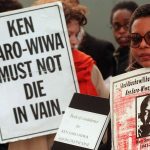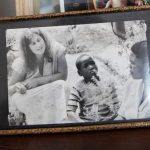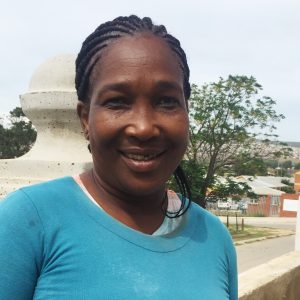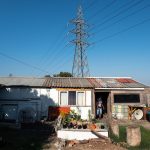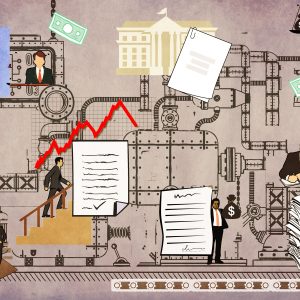Long Read | The detoxifier of Durban
Activist Des D’Sa has fought for workers’ rights and the environment for more than two decades, putting his life on the line to face off with massive polluters and exploiters.
Author:
8 April 2020

It made sense that the home of Des D’Sa was petrol-bombed in 2007: he was a notable enemy of big petroleum. And in the badlands of south Durban, the owners of the refineries that poison the coastline and its people don’t have to get their hands dirty when they want someone troublesome to go away. A shadowy complex of pliant local politicians, rotten cops and ghetto hitmen are ready to read between the lines and take the necessary steps on behalf of the area’s biggest employers.
“They wanted to kill us after midnight,” recalls D’Sa. “Fortunately, I had just got back from a meeting in Pretoria that night. I flew in at 10pm and I’m a light sleeper, so I just heard this big bang. BOOF! I got up. What’s going on? When I got to the door, it came at us like a ball of fire.
“They had put a petrol bomb underneath the door and stuffed the gap with cloth. I’m a trained fire officer, so the first thing I did was switch the mains power down and close all the windows. Our entire kitchen was burnt, but it didn’t spread further than the kitchen and bathroom. My wife and daughters were traumatised. I ended up in hospital at 2am and left at 7am, after the doctor came to check on me. I had some burns, but I said, ‘I’m leaving, doctor, thank you very much.’ I came back home and showed them my resolve. I’ve never stopped fighting.”
D’Sa is not exaggerating. For more than two decades, he has been the tormentor of KwaZulu-Natal’s worst polluters and exploiters, initially refinery giants such as Engen, Sasol and Shell, and more recently, mining companies, landfill operators and paper mill owners. He and his fellow activists in the South Durban Community Environmental Alliance use a battery of strategies: environmental monitoring, community mobilisation, passive resistance, formal legal resistance and the direct petitioning of global leaders.
Related article:
It’s a dangerous calling. D’Sa still lives on the outskirts of Wentworth, his neighbourhood for the past 50 years, on the southern shoulder of the Bluff. It’s a crime-scarred township that was designated for people classified as coloured under apartheid, and has supplied artisanal labour to the neighbouring refineries for decades. D’Sa says the community protects him from harm – despite the fact that, on at least two occasions, he says, local criminals have accepted money for his assassination. Aside from the fire-bomb attack, there was another close shave in 2001, when he was leading a strike action by chemical workers against the use of labour brokers and dangerous working conditions at the Engen refinery.
At the time, D’Sa was told by various community sources that a notorious Wentworth hoodlum – and a former bodyguard of President Jacob Zuma – had been contracted to knock him off. The man was scared off by an intimidating house call from striking workers, for whom D’Sa was an untouchable figure. Recalls D’Sa: “They said to him, ‘If you touch our man, that’s fighting for us, for just wages and permanent jobs, your whole family is going to be wiped out. We’re not going to allow you to touch him. There’s 8 000 of us. What do you want to do? Do you want to take on 8 000 people?’”
‘Even a slave knew who the master was’
D’Sa, who is 64, tells his stories in a staccato, barking rhythm, and he has a slightly hoarse voice, so he sounds like the Al Pacino of Wentworth. And like anyone who takes on powerful forces for decades on end, he clearly gets a kick out of the glory of righteous battle – a kick he first felt during his trade union days in the 1990s. Then he was the chief organiser for the South African Chemical Workers Union at the old Sasol refinery on the Bluff, where he had started out as a process technician.
“The first strike came in 1998 against Shell and BP. It was about the rise of casualisation and labour-broking. Suddenly you had so many middle men. You didn’t know who the master was. Even a slave knew who the master was. Suddenly you had different levels of bosses working for different companies. You could get fired by anyone at any time. The lowest person who would take the responsibility would be the labour broker, but you would in fact be fired by Shell or BP, by faceless people sitting in boardrooms giving instructions and issuing policies.”
Unsurprisingly, his own employer, Sasol, targeted him after the Shell-BP strike. “I was fired in 1998, on the pretext of ‘serious misconduct’, for defending workers. They got tired of me because they had tried to offer me senior positions, to offer me a car. But I kept being outspoken both on the outside, about pollution – heavy metals from the refineries were causing high rates of asthma and cancer in the community – and also on the inside, about worker justice and worker safety.”
Related article:
After getting the sack, D’Sa dug deep and fought back, fighting his own case in the labour courts while enlisting allies and publicising the dangers of the plant to the community and the plant. His wife carried on working as a cashier at a Spar supermarket, and the family struggled to pay the bills and put their four kids through school. “We won the case in court three years later, in 2001. Sasol paid us out. They had to shut down their chlorine plant in Isipingo because it was affecting all the children there, so they moved it to Sasolburg, running away from me!”
The South Durban refinery was also shuttered and replaced by a Sasol plant in Pakistan, he says, where the labour costs were cheaper.
‘We came for you’
The retreat by Sasol from the Bluff was a massive moral victory, but D’Sa was not satisfied. His next showdown was against Engen that year, when local workers went on strike demanding danger pay, back pay, improved safety conditions and permanent jobs. “I was hauled out of bed at 5am by the casual workers from Engen. Eight thousand of them wanted someone to lead them. They said, ‘Listen, we’ve been told not to leave here without you.’ And I said, ‘Why me? Aren’t there other people who could do this?’ They said, ‘No, no, no! We came for you.’”
He obliged. It didn’t help matters that Engen already had a problem with him. “They knew me from before that. In 1995, they tried to bribe me with R50 000 cash on the environmental issues and I refused to take the money. Plus money for projects, and a nice house. And I refused to take the money. And ever since, I’ve been fighting them.”
The 2001 Engen strike dragged on for six months, and D’Sa says police and intelligence agents tried and failed to infiltrate the strikers. After the organisers were arrested for possession of a hoard of workers’ refinery access tags – all entrusted to them by the workers to prevent strike-breaking – the late Catholic Archbishop of Durban Denis Hurley donated R20 000 for bail money. Fatima Meer was a crucial ally, and many strikers were fed and sheltered at the home of struggle stalwart Derrick McBride, father of Robert.
Related article:
D’Sa, meanwhile, was negotiating with a man called Barry Rawlins, an executive at Fluor, the multinational engineering firm with headquarters in the United States that managed labour brokerage contracts for Engen. Fluor had introduced the labour-broking system to the South African refinery industry. “I said to Barry at a meeting on a Friday, ‘These people haven’t been paid for so long. They want their danger pay, their back pay, their safety pay. Can you pay them today?’ He says, ‘I’m not going to do it.’ I said, ‘What about tomorrow? Get your people to make up the bank rolls!’
“He says ‘No, I’m going to the rugby.’ I say to him, ‘Look, is rugby more important than people’s lives? They’ve got families and children!’ He says rugby is important to him.
“So I brief the workers and say, ‘Barry Rawlins has told me that you all mean nothing to him. He’s more interested in going to the rugby, so he’s not going to pay out your back pay. He will think about it next week.’ He shouldn’t have said that. They went back into the refinery and all hell broke loose. I’ve never seen workers so angry.”
Rawlins relented that Monday and a deal was struck at the Clairwood racecourse. Aside from the payment of back pay, it included a move away from labour brokers. “They don’t give them long-term contracts, but at least they knew that the main contractor, Group Five, was the boss.”
Related article:
That was another big weapon, and the criminal case against the strike organisers was thrown out of court. But the refineries could still deploy one of their favourite weapons: 300 of the main strike leaders were blacklisted, which meant they could not get a job, or even casual work, anywhere in the refinery industry. “Me and my family were also blacklisted. My sisters and one of my brothers said, ‘We don’t want to talk to you, we will lose our jobs.’ My younger brother was in the engineering trade and didn’t work for a couple of years, so he had to become a fisherman.”
“My kids paid the price,” says D’Sa. “My wife and I had to save every single cent. Tough as it was, all my kids passed matric, and some went to university and got degrees.” Two of his children are school teachers and one has a corporate job.
“So the kids realised the resilience of their parents. So they know how to build their own families. That’s the type of people we were. I still live in the same small flat that my parents were forced to move to in 1969.”
The dream of Cato Manor
D’Sa is a kind of Durban everyman. His ancestry is Zulu, Indian and British. “My maternal grandmother, uGogo, was Zulu – a Dlamini – and her husband, whose surname was Vere, was a member of the Dunn lineage of southern KwaZulu-Natal.” The Dunns are all descendants of John Robert Dunn, a 19th-century British settler who became King Cetshwayo’s secretary and diplomatic adviser and was rewarded for his services with chieftainship, land, livestock and 48 Zulu wives to keep his British wife company.
The paternal side of his family comes from Goa, India. His father worked in the Cato Manor office of the agent-general of India, a diplomatic posting that acted for South African Indians on behalf of the post-independence Indian government. “You had to sign up and register with them to be subjects of India, and my mother was a nurse there and met my father.” The couple had 13 children and Des grew up in the verdant enclave of relative freedom that was Cato Manor before the evictions of the 1960s.
Related article:
In the 1950s, Cato Manor was by no means a multiracial utopia. There were bloody confrontations between Indian landowners and Zulu migrant workers living in hostels. But there was a rich cultural ferment developing in food, arts and language. “We would eat isigwamba – mielie meal and spinach – and Hindu food and Muslim food. And the Afrikaners would also come play their guitars with us. There was no such thing as an invitation. You would just show up. Everybody was invited to anybody’s wedding or dance.” (The milieu also inspired the writer and journalist Nat Nakasa, who grew up in Cato Manor, and guitar legend Madala Kunene, who recalled playing Cliff Richard covers at local weddings on his first guitar.)
“We had a huge piece of land,” says D’Sa. “Lovely running water, and chickens, and every fruit and vegetable you could think of in the garden. The only thing we had to buy was meat, and we would do that through selling our vegetables. I learnt at a very young age to go to the market and sell.”
Fishing expeditions were a liberating and formative experience. He is now a fierce activist for the rights of subsistence fishers at Durban harbour. “Me and my brothers would take a train from Bellair station to Congela, where the water came out warm from the old power station. The fishing was great. It wasn’t toxic water, just warm. Sometimes the railway police would catch us, but mostly they wouldn’t. We’d catch a whole lot of mullets and milkies, and mud prawns on the sandbank, and we’d cook on the beach sometimes, with salt and tomato and onions.”
Welcome to Wentworth
D’Sa’s Cato Manor dream darkened in 1966 when the eviction squads rolled in. “My parents were told, ‘If you don’t move, you are not going to get your state pension.’ They came with their big trucks and guns and separated us.” The parents and 13 siblings were carted off to different ghettos according to their skin tones and hair textures. “We were given the green ID card, and classified either Coloured or Other Coloured or Cape Coloured, depending on our looks and our hair. Some were sent to Chatsworth, others to Newlands, others to Wentworth, others to Chesterville. Some of the fairer cousins were given Greenwood Park and Sydenham.”
After a two-year stint in Chatsworth, D’Sa wound up with his parents and a clutch of his siblings in a two-bedroom flat in Wentworth. For a child raised largely outdoors, the cramped flatlands came as a shock. “There were no parks when we came. We built six parks in Wentworth, with parolees from prisons, over the years. We had a lot of gangs here in the 1970s. And people came to Wentworth from all over SA, from central Durban, from Warwick Triangle, from Transkei. People from Matatiele, Bizana, Kokstad, Cedarville, Mthatha… farmers and traders who were kicked out of those towns.”
In the 1970s, the mixed-race former residents of Transkei in Wentworth were known as “Mpondos”. “They would carry sticks and spoke Xhosa. But we all get on now. Fifty years is a long time. We had to adapt and learn how to live with one another.”
Related article:
As Wentworth cohered into a community, a kind of cultural competition with slightly more comfortable districts reserved for people classified as coloured emerged, says D’Sa. “Steve Fataar and the Flames were from Sydenham. Now my cousins here in Wentworth, the McKnights, they played for The Insects. There was a rivalry between the Flames and the Insects.”
And with the refineries on their doorstep, providing a steady market for maintenance and construction work, the male youth of Wentworth began to master the trades of welding and fitting and turning. But since democracy, the casualisation and exploitation of black artisans have forced many of those skilled workers to go abroad. Sons of Wentworth ply their trade on plants and rigs all over the globe, from New Zealand to the United States, says D’Sa.
And wherever they go, Wentworth welders call themselves the “Bangles”, because their welds are said to be as seamless as a silver bangle.
A coalition of the poor
D’Sa’s childhood immersion in the ethnic mix of Cato Manor, and his fluency in isiZulu, have helped him to build alliances across the social movements of KwaZulu-Natal. His own organisation, the South Durban Community Environmental Alliance, has joined a “coalition of the poor” with the shack dwellers’ movement Abahlali baseMjondolo, the hostel dwellers’ organisation Ubunye bamaHostela, and with organisations representing fishers, street traders and market users.
“We’re adding our voices to the struggles of other poor people,” says D’Sa. “We are all facing the same struggle against abuse by government, from people hard of listening, and a government failing to change inequality. If we work together, government can’t afford not to listen to each other. And there are more eyes watching each other, to keep each other safe.” D’Sa was an early supporter of Abahlali baseMjondolo. He spoke at its first legal march in 2005 and is always given a platform to speak at its annual UnFreedom Day rally in April.
Related article:
His appetite for battle has taken him further afield to the global fortresses of big oil. “We take the local struggle to the international arena and present the facts over there,” he says. His organisation owns a single share in Royal Dutch Shell, which entitles him or other members to speak at annual general meetings.
A few years ago, D’Sa confronted Shell’s leadership in London about why the company hadn’t rolled out to its African refineries a sulphur recovery unit technology it had pioneered in its Fredericia refinery in Denmark, which slashes sulphur dioxide emissions. Seven years had passed, he asked, why no clean tech in Durban? “They said, ‘Your government won’t allow us to build it. The Europeans were better, they wanted us to do it.’ And I said, ‘You lie. You’ve treated our lives as secondary. That’s the problem.’”
After Shell took a grilling in a hearing at Britain’s House of Commons from Labour members of Parliament who cited D’Sa’s challenge, the company was forced to act. “They replaced their rotten pipelines at a cost of R800 million because of our campaigning, not because the city required it. They were producing something like 14 000 tonnes of sulphur dioxide a year, and 2 000 tonnes in Fredericia. Now they’ve brought the recovery unit to SA, 15 years after they introduced it in Europe, and reduced their sulphur output to 4 000 tonnes a year. I think it’s even dropped further than that because they’re now selling the sulphur as a product.”
“People said, ‘You ain’t gonna win against these people, dude, these are giants.’ But I must say we did win. We showed even a small man can win.”
Other polluting giants who have been blocked by D’Sa and his network include Anglo-American, paper giant Mondi, and the landfill operators Enviroserv and Wasteman. D’Sa takes a deep pride in shutting down dirty plants.
Related article:
But he says he is far less vulnerable and brave than the rural activists who take on corrupt traditional authorities, such as Kevin Kunene, the Richards Bay environmental campaigner who was murdered in 2012.
“Chiefs and indunas can become killers,” he says. “So we have to be aware that any exposure of the work that we’re doing to help communities comes with a risk. The chiefs are being paid off by these mining companies and threatening to kill people. Many activists have had to move out of their areas.”
D’Sa has crossed swords with some arch-villains of state capture. When former Transnet chief executive Brian Molefe was pushing a Japanese-funded project to link Durban harbour to a new port accessing chrome deposits at the old Durban international airport site, D’Sa and his team swung into action, even lobbying the Barack Obama administration’s energy department to block the deal. “Molefe called me and said to me at a meeting that I was more interested in stopping jobs, and I was against black people,” says D’Sa.
“He didn’t know my history. Said I was more for frogs and snakes and chameleons. I said, ‘Listen, I’m a frog lover, I’m a snake lover, I’m a butterfly lover, I’m for every species. I speak for them because they can’t speak for themselves. But I’m not for myself.’”

